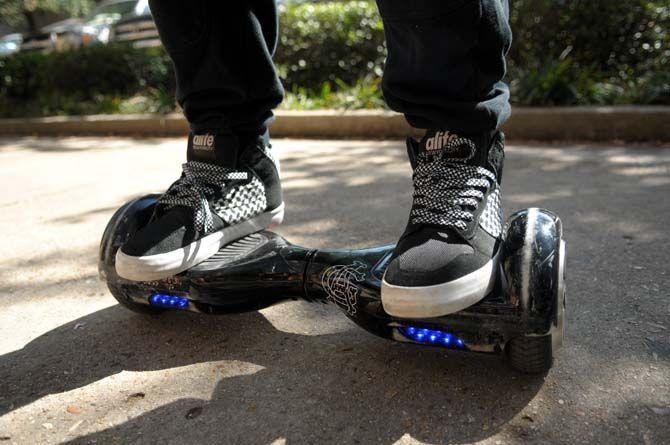Sights of students self-balancing their way through the Quad to get to class will no longer be commonplace this semester, putting cycling and walking back in business.
A collaboration among the university’s leadership, risk management, safety department and environmental health services departments led to a ban on self-balancing scooters, commonly known as hoverboards, effective Dec. 30, 2015.
Catherine David, associate director of communications and development for Residential Life, said the department began looking into the safety risks after more than 60 airlines and universities banned the self-balancing scooters and Amazon stopped shipping them.
University officials notified students of the policy change via an email from the Department of Residential Life. According to the email, the ban was put into effect after the electronic devices’ batteries catching fire made national news.
“We have made the decision to prohibit the use, possession or storage of electronic skateboards including self-balancing boards/scooters and other similar equipment in all university-managed residence halls, apartments and Greek houses, until safety standards for them have been adequately developed and implemented across all models. We are not willing to risk your safety and your community’s safety,” the email read.
A university broadcast email sent to students Monday reported the devices would be prohibited from all campus buildings.
To date, Nicholls State University, Southeastern Louisiana University, University of Louisiana at Lafayette and LSU are the only schools to have banned these devices in the state.
“Any time we make a change in our policy, it’s to do what’s in the best interest of our residents and their safety,” she said.
John Borne, deputy chief information officer of risk and security, clarified that the devices are only banned from on-campus buildings, not from outside areas.
“The ban is really a temporary measure,” Borne said. “We’re going to reassess it each semester to see the state of the technology … and as it gets better, we’re looking to repeal those things.”
He said the university is “sensitive” to these risk and safety issues because it is the first year LSU has had its own risk program, which affords the university ownership of its own insurance.
No other Louisiana campus procures its own insurance, he said.
Borne said to his knowledge the university has not seen a problem with the self-balancing scooters injuring others on campus.
“We’re trying to find a balance on how to be safe and protect the resources,” he said. “We’re not trying to ‘helicopter’ students … everybody’s an adult here.”
David said LSU has not received a large response or backlash from any current or future residents or their parents.
The university will issue consequences for using the self-balancing scooters in on-campus facilities by following a standard accountability process, which is governed by Residential Life’s policies outlined in the Living on Campus Handbook and one-year housing contract that student residents sign.
Political science junior and hoverboard owner Anna Cahill said she does not think banning the self-balancing scooters is “necessary” because the danger lies in overcharging — not riding — the devices.
“I think it’s unfortunate for people who bought the boards with the intention to use them on campus, especially those that live in dorms or other residencies around campus that now have to leave their boards at home,” Cahill said.
The recent ban, however, did not phase LSU men’s basketball forward Ben Simmons, who once owned a hover board.
“I’ve got legs,” he chuckled. “I’ll walk.”
Popular self-balancing scooters banned from campus buildings, present safety risk
January 12, 2016
Donnie Alfred on his self balancing scooter.
More to Discover








